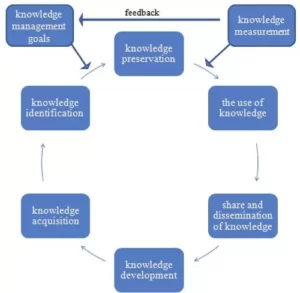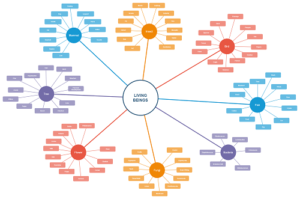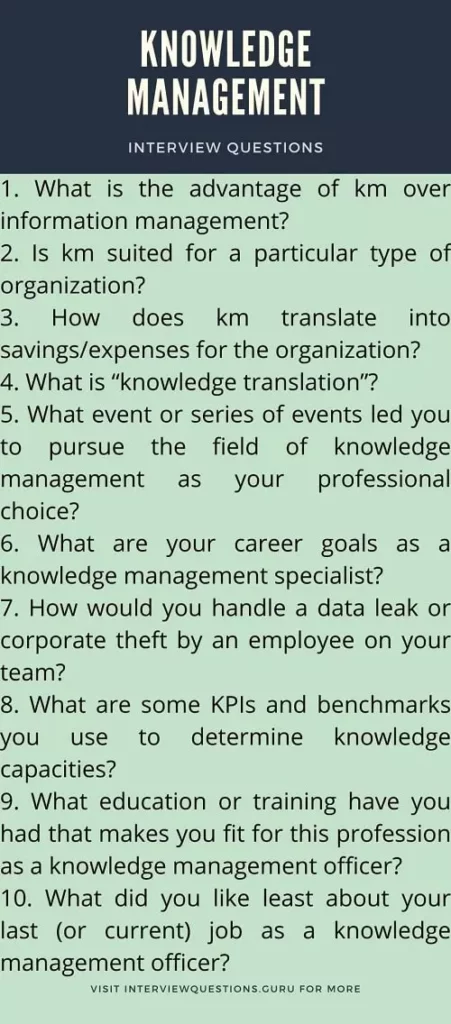Every organization has knowledge management and it is an essential need for any organization to run smooth operations. In this article, we have shared knowledge management interview questions that can help aspirants looking for knowledge manager, knowledge analyst, knowledge system engineer roles.

Table of Contents
Knowledge Management Interview Questions
What is Knowledge Management in simple words?
Knowledge management is the process of gathering, creating, analyze, sharing, managing the knowledge and information of an organization, product, service, anything. Knowledge management practice is being followed for centuries.
What is ITIL Knowledge Management?
ITIL Knowledge management is the central process responsible to gather, analyze, store and share the knowledge created for IT service to other IT Service Management processes. It is aimed to help the service desk, operations make decisions and resolve recurring and standard issues.
What is Service Knowledge Management System?
Service Knowledge Management System is also abbreviated as SKMS is a set of tools, databases, and systems that are used to manage and store knowledge and successfully implement knowledge management.
There are four layers of SKMS
Data and information layer.
Information integration layer.
Knowledge processing layer.
Presentation layer.
What is a known error?
Known errors are the bugs that are yet to be fixed and there are known root causes. Usually, there is a workaround provided for a temporary fix and the issue will be fixed in the next patches, hotfix, versions, next releases.
What is KMDB?
KMDB is an abbreviation of a knowledge management database with stores and manages all the knowledge details and information.
What are the key principles of knowledge management?
The key principles of knowledge management are
Knowledge is a valuable asset.
Knowledge should be captured whenever possible.
Knowledge management is quality controlled.
Knowledge increases when reused.
Knowledge is shared.
Knowledge is accessible.
Knowledge is searchable.
Knowledge is measured.
Knowledge is improved.
Work produces knowledge.
Knowledge is timeless.
Knowledge is universal.
Knowledge is scalable.
Knowledge underpins organizational learning.
Knowledge should be stored in a central repository.
What are the components of knowledge management?
Components of knowledge management are
- People
- Process
- Strategy
- Content
- Operational information
- Organizational information
- Reference information
- Customer information
- Collaborative flow.
What are the difficulties or challenges of knowledge management?
There challenges while implementing and managing knowledge are
Obsolete technology.
Searchable knowledge and information.
Employee motivation to contribute.
Securing knowledge.
Up to date knowledge.
Rewarding contributors.
Analyze feedback.
Interpret data effectively.
Support from leadership and management.

What are the benefits of knowledge management?
Some of the benefits are
- Improve decision-making.
- Accelerate delivery.
- Promote knowledge.
- Increase customer satisfaction.
- Promote innovation.
- Speed up operations and access to knowledge.
- Easy learning.
- Managing known errors.
- Quick problems solving.
Who is responsible for maintaining a knowledge management system?
Knowledge manager.
Knowledge editors.
Knowledge approver.
Knowledge leaders.
Knowledge analyst.
Knowledge system engineer.
Knowledge transfer engineer.
How knowledge management is related to incident management?
Knowledge management helps users to resolve incidents with existing solutions and also relate existing issues. Incident can also feed knowledge by sharing permanent resolution of an incident.
Best Incident Management Interview Questions
How knowledge management is related to problem management?
The problem can feed knowledge by adding known errors with workaround and root cause of the issue. Problem management can also use the existing resolved issues as solutions to a problem.
Best Problem Management Interview Questions
Share some best practices to implement knowledge management?
Some of the best practices for knowledge management are
Know problems of the organization, service.
Make knowledge accessible.
Make knowledge secure and provide access to people who are authorized for it.
Motivate employees to contribute.
Keep knowledge up to date.
Retire obsolete knowledge.
Assign knowledge executives.
Share some knowledge management tools?
Dropbox
Microsoft one drive
Dokuwiki
Slack
Trello
BMC Remedy
ServiceNow
Monday.com
Yammer
Fresh works
Zen desk
Bit.ai
Confluence
GitHub
GetGuru
Tettra
Share some ITIL Knowledge Management KPIs?
- Number of KM documents created
- Number of Knowledge Articles Active
- Number of times a KM document is accessed
- Number of KM documents used to resolve Interactions
- Number of KM documents used to resolve Incidents
- Number of KM documents with a review date
- Total rating of published knowledge articles
- Number of Article Views by Unauthenticated Users
- Number of Knowledge Searches with Rank
What is feedback in KM?
Feedback is the method through which users can share their views about the knowledge database or knowledge or knowledge articles shared with them.
Feedback can be provided in various ways
Feedback can be recorded by comments on the article.
It can also be recorded by stars or rating for any knowledge.
A helpful button on knowledge can also be added to record feedback.
Flag an article as incorrect or inappropriate.
ask users if the knowledge is relevant or not.
All these methods help knowledge managers to decide that knowledge needs to be updated, retired or information is up to date and users interact with knowledge.
Why feedback is important in KM?
Feedback is important for
Relevancy
Effective learning
Improve process.
Updated knowledge.
Interaction of customers.
Improved knowledge.
Obsolete knowledge.
Who can create knowledge articles?
Knowledge managers and technical specialists can create knowledge articles.
How to track knowledge articles usage?
It can be tracked through adding page views counter, through feedback, and searched terms.
Can we track if the knowledge article is helpful?
Yes, it can be also tracked through feedback helpful options.
What is the difference between information and knowledge?
Information is the organized data available on a particular topic that can be obtained from the internet, news, television. Knowledge on the other hand means awareness or understanding of the subject by a person through his own experience.
What is a knowledge map?
It is a graphical representation of knowledge where and how it can be found and how it is clubbed or grouped in a structure. It can also be called an inventory of knowledge.

Other ITIL Knowledge management Interview Questions
Characteristics of a good knowledge article?
What is knowledge transfer?
What is the knowledge audit?
What is the difference between skill and knowledge?
What are the different sources of customer knowledge?
How do you improve customer knowledge?
What is an example of knowledge management?
How does customer knowledge help in CRM?
How knowledge management will improve the operations?

If you have also through knowledge management interview questions, you can share your experience in the comment section and we will publish it may help other job seekers.